Introduction
Healthcare is lagging in digital marketing. Surprised? It shouldn't be. While other industries embrace online strategies, healthcare often relies on outdated methods.
Digital marketing for healthcare is the solution to this. Patients now search for doctors online. They read reviews before booking appointments.
The global digital health market, which encompasses digital marketing for healthcare, is projected to reach $639.4 billion by 2026, growing at a CAGR of 28.5% from 2019 to 2026, according to Allied Market Research. This surge underscores the increasing importance of digital marketing for healthcare.
Digital marketing for healthcare tools have expanded beyond traditional methods, with 72% of internet users searching online for health information, according to Pew Research Center. This shift has prompted healthcare providers to adopt innovative digital strategies, including the use of healthcare chatbots.
Chatbots in healthcare are revolutionizing patient engagement, with a report by Juniper Research predicting that chatbots will save the healthcare industry $3.6 billion globally by 2022.
As we explore how to implement digital marketing for healthcare, we'll delve into strategies that leverage these trends and tools to enhance patient outreach, improve engagement, and ultimately deliver better healthcare outcomes.
Benefits of Digital Marketing for Healthcare
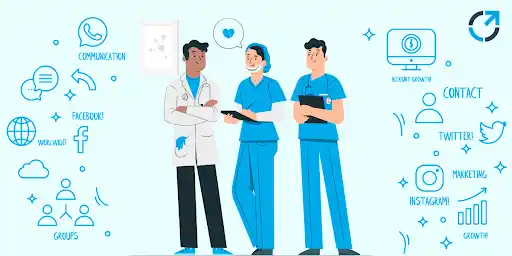
Digital marketing for healthcare offers numerous advantages that can help healthcare providers thrive in an increasingly digital world.
Here are some key benefits of digital marketing for healthcare:
- Increased Patient Engagement: Patients today use the internet to search for medical information and services.
By maintaining an active online presence, healthcare providers can engage with patients more effectively. For example, regular blog posts about common health issues can keep patients informed and connected.
- Better Accessibility: Digital marketing for healthcare is more accessible. For instance, patients can book appointments online or consult with doctors via telemedicine.
This convenience encourages more patients to seek care when they need it.
- Improved Patient Education: Through informative content like articles, videos, and infographics, healthcare providers can educate patients about various health conditions and treatments.
This not only empowers patients but also helps them make informed decisions about their health.
- Targeted Marketing: Digital marketing for healthcare allows healthcare providers to target specific demographics.
For example, a pediatric clinic can run social media ads targeting parents of young children in their area. This ensures that marketing efforts are reaching the right audience.
- Cost-Effective Advertising: Compared to traditional advertising methods, digital marketing for healthcare is often more cost-effective.
Social media ads and email campaigns can reach a large audience without the high costs associated with TV or print ads.
Implementing Digital Marketing for Healthcare
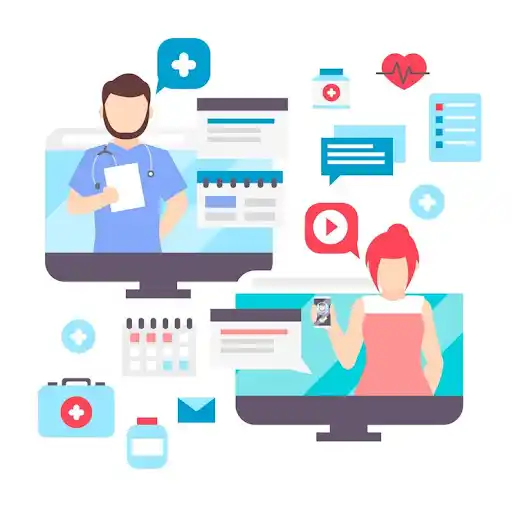
Implementing digital marketing for healthcare can significantly improve patient engagement and streamline services.
By understanding your audience, building a strong online presence, and optimizing for search engines, you can create a comprehensive digital strategy that meets your patients' needs.
Understanding Your Audience
Before diving into digital marketing for healthcare, it's crucial to understand your audience. Knowing who your patients are and what they need can help tailor your marketing efforts more effectively.
- Demographic Analysis: Identify the age, gender, location, and other demographics of your patients. For example, a geriatric clinic might focus on older adults living in nearby retirement communities.
Understanding these demographics helps in creating targeted content that resonates with your audience.
- Patient Preferences: Find out what your patients prefer in terms of communication and content. For example, some patients might prefer receiving information through emails, while others might be more active on social media.
Conduct surveys or use analytics tools to gather this data.
- Patient Needs: Understand the common health concerns and needs of your patients. For example, a clinic specializing in diabetes care should focus on creating content related to diabetes management, diet, and exercise.
This ensures that your content is relevant and useful to your audience.
Building a Strong Online Presence
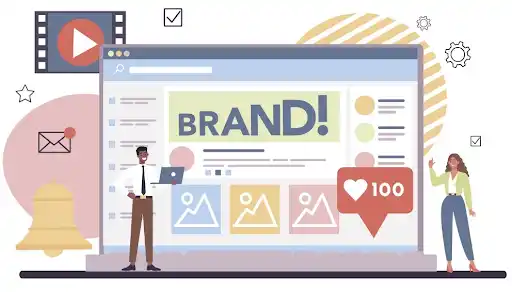
A robust online presence is the foundation of digital marketing for healthcare. Here’s how to build and maintain digital marketing for healthcare:
- User-Friendly Website: Your website is often the first point of contact for potential patients. Ensure it is easy to navigate, mobile-friendly, and contains all essential information.
For instance, having clear sections for services, contact information, and patient testimonials can make your website more user-friendly.
- SEO Optimization: Optimize your website for search engines to attract more visitors. Use relevant keywords like "healthcare services in [your location]" to improve your ranking.
For example, if you run a dental clinic, including keywords like "affordable dental care in [city]" can help attract local patients.
- Engaging Content: Regularly update your website and social media with informative and engaging content. This could include blog posts, videos, and infographics about common health issues.
For example, a blog post explaining the importance of flu shots can educate patients and encourage them to visit your clinic for vaccination.
- Social Media Presence: Use social media platforms to connect with your audience. Share health tips, clinic updates, and patient success stories. For example, a dermatology clinic could share before-and-after photos of acne treatments (with patient consent) to showcase their success stories.
- Healthcare Chatbots: Implementing a healthcare chatbot as a tool for digital marketing for healthcare on your website and social media can enhance patient interaction.
Chatbots in healthcare, like BotPenguin, can answer common questions, assist with appointment bookings, and provide information on services.
For example, a chatbot for healthcare can guide a patient through the process of booking a consultation or provide quick answers to FAQs about clinic hours and services.
Search Engine Optimization (SEO)
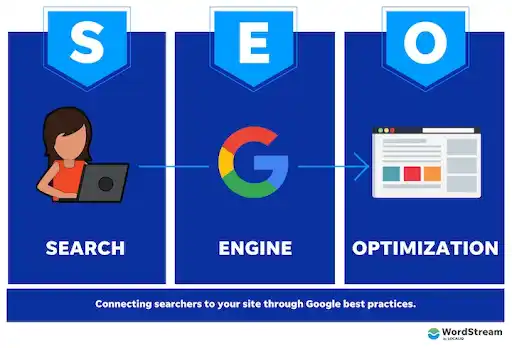
Search engine optimization (SEO) is a critical component of digital marketing for healthcare. Digital marketing for healthcare ensures that your website appears in search engine results when potential patients look for healthcare services.
- Keyword Research: Identify the keywords that potential patients use when searching for healthcare services. For example, if you run a physical therapy clinic, keywords like "back pain treatment" or "physical therapy near me" are crucial.
Use these keywords naturally throughout your website content as a strategy for digital marketing for healthcare.
- On-Page SEO: Optimize each page of your website for search engines. This includes using keywords in your titles, headers, and body text.
For example, an article on diabetes management should include relevant keywords like "diabetes care" and “managing blood sugar levels.”
- Local SEO: Since most healthcare services are location-based, local SEO is essential. Ensure your clinic's name, address, and phone number (NAP) are consistent across all online platforms.
For instance, list your clinic on Google My Business and ensure the information matches your website.
- Quality Content: Search engines favor high-quality, informative content in digital marketing for healthcare. Regularly update your website with blog posts, articles, and videos that address common health questions and concerns.
For example, an eye clinic could post articles about preventing digital eye strain.
- Backlinks: Obtain backlinks from reputable websites to improve your site's authority. This could involve writing guest posts for health blogs or collaborating with local businesses.
For instance, a nutritionist could contribute an article to a well-known health magazine, linking back to their website.
- Technical SEO: Ensure your website loads quickly, is mobile-friendly, and has a secure HTTPS connection. This is important in digital marketing for healthcare to not lose audience.
For example, use tools like Google PageSpeed Insights to identify and fix issues that might slow down your site.
Suggested Reading:
How to Implement Healthcare Marketing Automation?
Content Marketing
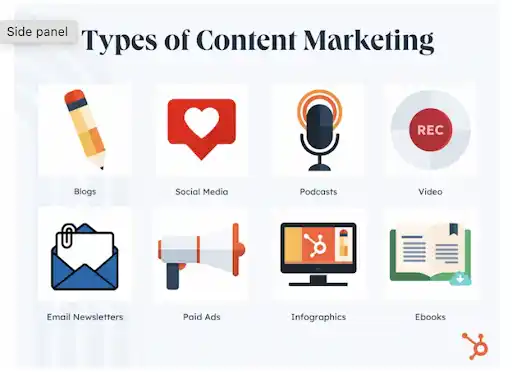
Content marketing is a vital part of digital marketing for healthcare. Digital marketing for healthcare involves creating and sharing valuable content to attract and engage your audience.
- Educational Blog Posts: Write blog posts that address common health concerns and provide practical advice.
For instance, a family clinic could publish articles on managing seasonal allergies, offering tips on prevention and treatment. This not only educates patients but also establishes your authority in the field.
- Video Content: Create videos that explain medical procedures, introduce staff, or provide health tips.
For example, a surgical center could produce a video tour of its facilities, explaining the patient's journey from check-in to recovery. Videos are engaging and can help demystify complex medical processes.
- Infographics: Use infographics to simplify complex health information. For example, a cardiology clinic might create an infographic showing the warning signs of a heart attack and steps to take if one occurs.
Infographics are easily shareable and can enhance your reach on social media.
- Patient Stories: Share testimonials and success stories as the next strategy in digital marketing for healthcare.
For instance, a physical therapy clinic could feature a patient who has recovered mobility after an injury, detailing their treatment journey.
This builds trust and demonstrates the effectiveness of your services.
Implementing Chatbots
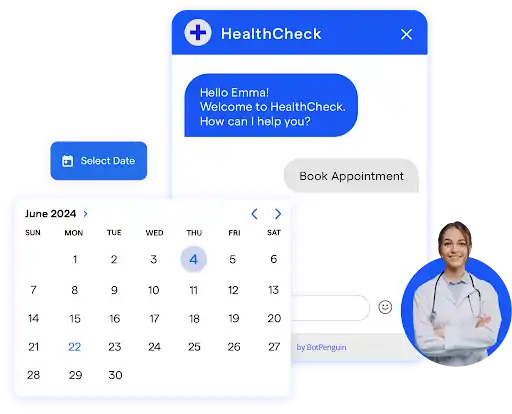
Chatbots in healthcare can significantly improve patient interaction and service efficiency.
Chatbots in healthcare can be deployed on platforms like WhatsApp, Facebook Messenger, Instagram, and your website.
- Appointment Booking: A chatbot for healthcare can streamline appointment scheduling. For example, a patient can use a chatbot in healthcare on your website to book a doctor's visit, reducing the need for phone calls and manual scheduling.
- Customer Service: Chatbots for healthcare can handle common inquiries, such as clinic hours, services offered, and insurance information.
For instance, a patient messaging your clinic's Facebook page can get instant answers to their questions via a healthcare chatbot.
- Reminders and Notifications: Chatbots for healthcare can send automated reminders for appointments and medication schedules.
For example, a clinic can use WhatsApp to remind patients about their upcoming appointments, reducing no-show rates.
- Marketing Purposes: Chatbots can engage users who click on ads. For instance, a "click to WhatsApp" ad for a wellness program can direct users to a chatbot that provides more information and guides them through the sign-up process.
This can be an integral part of your lead generation funnel.
- Strategic Placement: Place chatbots at key points in the patient journey, such as on landing pages for ad campaigns.
This ensures potential leads are engaged immediately, improving conversion rates.
Social Media Marketing
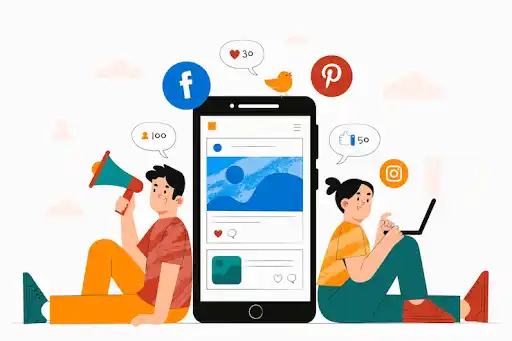
Social media platforms are powerful healthcare marketing tools. They allow you to reach a broad audience, engage with patients, and share valuable content.
- Choosing the Right Platforms: Identify which social media platforms your patients use most. For example, younger patients might be more active on Instagram, while older patients might prefer Facebook.
Focus your efforts on the platforms that will yield the best engagement.
- Consistent Posting: Maintain a consistent posting schedule to keep your audience engaged. For example, a dental clinic could post weekly tips on oral hygiene, monthly promotions, and patient testimonials.
Consistency helps keep your practice top of mind for your audience.
- Interactive Content: In digital marketing for healthcare encourage interaction by posting questions, polls, and contests.
For instance, a pediatric clinic could run a photo contest asking parents to share pictures of their kids brushing their teeth, with a prize for the best photo. Interactive content increases engagement and makes your page more dynamic.
- Healthcare Chatbots: Implementing a healthcare chatbot on social media can enhance patient interaction.
Chatbots in healthcare can provide quick responses to inquiries, help book appointments, and share basic health information.
For example, a chatbot for digital marketing for healthcare on your Facebook page can assist patients with booking flu shot appointments during flu season.
Suggested Reading:
11 Creative Ideas for Healthcare Lead Generation
Using Google My Business Profile
A well-maintained GMB profile is crucial for digital marketing for healthcare. It provides essential information to potential patients and can be enhanced with automation tools like chatbots.
- Accurate Information: Ensure your GMB profile includes accurate details like address, phone number, hours of operation, and services offered.
For example, a clinic should list its specialties, such as "pediatrics" or "cardiology," to help patients find the right care.
- Photos and Updates: Regularly update your GMB profile with photos and posts about your services. For instance, share images of your clinic, staff, and any special events or health tips.
This makes your profile more engaging and informative.
- Automated Responses: Use chatbots to automate responses to common inquiries. For example, if a patient clicks the WhatsApp button on your GMB profile, they can initiate a conversation with a healthcare chatbot.
The chatbot can provide general information, answer frequently asked questions, and guide the patient through booking an appointment.|
- Appointment Scheduling: Integrate chatbots for appointment scheduling directly from your GMB profile. For example, a patient using WhatsApp can chat with the bot, which will offer available appointment slots and confirm bookings.
By doing this in digital marketing for healthcare, it reduces the need for manual scheduling and improves patient convenience.
Email Marketing

Email marketing is a direct and personal way to communicate with your patients.
Digital marketing for healthcare helps you share important updates, promote services, and maintain patient relationships.
- Building an Email List: Collect email addresses through your website, social media, and in-clinic sign-ups.
For example, offer a free eBook on healthy living tips in exchange for signing up for your newsletter. This helps grow your email list with interested recipients.
- Crafting Effective Emails: Write clear and concise emails that provide value in digital marketing for healthcare.
For instance, a nutrition clinic could send monthly newsletters with healthy recipes, upcoming events, and success stories. Ensure each email has a clear purpose and call-to-action.
- Personalization and Segmentation: Personalize emails to make them more relevant.
For example, a general practice could segment its email list by age group, sending seniors information about managing chronic conditions and younger adults tips on preventative care. Personalization increases the likelihood of engagement.
- Automated Campaigns: Use automated campaigns to send timely information. For instance, an ophthalmology clinic could set up an automated reminder system for annual eye exams, ensuring patients don’t miss important appointments.
Automation saves time and ensures consistent communication.
Effective digital marketing for healthcare includes a variety of strategies that help you reach and engage with patients.
Paid advertising, implementing chatbots in healthcare, leveraging patient reviews, and using data analytics are crucial components. These tools can significantly enhance your digital marketing for healthcare efforts, streamline operations, and improve patient satisfaction.
Paid Advertising

Paid advertising is a powerful way to reach a larger audience quickly. It allows you to target specific demographics and measure the effectiveness of your campaigns.
- Google Ads: Use Google Ads to target people searching for healthcare services. For example, a dental clinic can create ads targeting keywords like "emergency dental care" to attract patients needing urgent services.
This ensures your ads are shown to users actively seeking your services.
- Social Media Ads: Platforms like Facebook and Instagram offer targeted advertising options. For instance, a fertility clinic could run ads targeting women aged 25-40 in specific geographic areas.
These ads can include engaging visuals and direct calls to action, such as booking a consultation.
- Retargeting Campaigns: Use retargeting to reach people who have previously visited your website but didn’t convert.
For example, an orthopedic clinic can retarget users who viewed the knee surgery page but didn’t make an appointment. Retargeting keeps your services top of mind for potential patients.
- Budget Management: Allocate your budget wisely. For instance, start with a smaller budget to test different ad formats and messages.
Gradually increase spending on the most effective ads. This approach ensures you get the best return on investment.
Suggested Reading:
11 Creative Healthcare Marketing Strategy Ideas
Patient Reviews and Testimonials
Patient reviews and testimonials are vital for building trust and credibility. They provide social proof that can influence potential patients’ decisions helpful for digital marketing for healthcare.
- Collecting Reviews: Encourage satisfied patients to leave reviews on platforms like Google and Yelp.
For example, after a successful treatment, send a follow-up email requesting feedback and providing links to review sites. Positive reviews enhance your online reputation.
- Showcasing Testimonials: Display testimonials prominently on your website and social media. For instance, feature patient stories on your homepage or a dedicated testimonials page. Real-life experiences resonate more with potential patients.
- Handling Negative Reviews: Address negative reviews professionally and promptly. For example, if a patient leaves a negative review about long wait times, respond with an apology and an explanation of steps being taken to improve.
This shows you value patient feedback and are committed to improvement.
Data Analytics and Monitoring

Using data analytics is essential for measuring the success of your digital marketing for healthcare efforts. It helps you understand what’s working and where improvements are needed.
- Tracking Key Metrics: Monitor metrics such as website traffic, conversion rates, and social media engagement.
For example, use tools like Google Analytics to track how many visitors come to your site from specific ads. This data helps you refine your strategies.
- Patient Behavior Analysis: For the next step in digital marketing for healthcare, analyze patient behavior on your website.
For instance, track which pages are most visited and how long users stay on each page. This can inform you about what content resonates most with your audience.
- Campaign Performance: Regularly review the performance of your marketing campaigns. For example, compare the click-through rates and conversions of different Google Ads to identify the most effective ones.
Adjust your campaigns based on these insights to improve results.
- ROI Calculation: Calculate the return on investment for each marketing effort. For instance, if you spend $500 on a Facebook ad campaign and gain five new patients, determine the revenue generated by those patients to assess the campaign’s profitability.
Conclusion
In conclusion, implementing digital marketing for healthcare has become essential for providers and organizations looking to thrive.
One of the most promising developments in digital marketing for healthcare is the integration of chatbots in healthcare.
Platforms like BotPenguin offer sophisticated healthcare chatbot solutions that can enhance patient engagement, provide 24/7 support, and streamline various processes. These chatbots for healthcare are revolutionizing how patients interact with healthcare providers, offering quick access to information and support.
As we've explored, successful digital marketing for healthcare requires a multi-faceted approach. From optimizing websites for search engines to creating valuable content that educates and informs patients, healthcare marketing strategies must be comprehensive and patient-centric.
Looking ahead, the role of healthcare marketing tools, including advanced chatbots in healthcare, will only continue to grow.
By embracing these technologies and continuously adapting their digital marketing strategies, healthcare providers can improve patient outcomes, enhance their online presence, and ultimately deliver better care.
Remember, the key to successful digital marketing for healthcare lies in balancing innovative digital tools with the human touch that is so crucial in healthcare.
Suggested Reading:
Boosting Patient Engagement with a Chatbot for Healthcare
Frequently Asked Questions (FAQs)
What is digital marketing for healthcare?
Digital marketing for healthcare involves using online platforms and strategies like SEO, content marketing, social media, and email campaigns to reach and engage with patients, improve healthcare services, and grow your practice.
What are the benefits of using chatbots in digital marketing for healthcare?
Chatbots in healthcare marketing offer 24/7 support, automate appointment bookings, answer common patient queries, send reminders, and enhance overall patient interaction and satisfaction.
How do patient reviews impact digital marketing for healthcare?
Patient reviews build credibility and trust, influencing potential patients' decisions. Positive reviews attract more patients while addressing negative reviews professionally can improve service quality and patient satisfaction.
How can a GMB profile help in local SEO for healthcare providers?
A well-optimized GMB profile improves local SEO by increasing visibility in local searches, making it easier for nearby patients to find and choose your healthcare services.
What are some tips for collecting patient reviews on GMB?
Encourage satisfied patients to leave reviews by sending follow-up emails or texts with direct links to your GMB profile, and respond to reviews promptly to show you value feedback.


